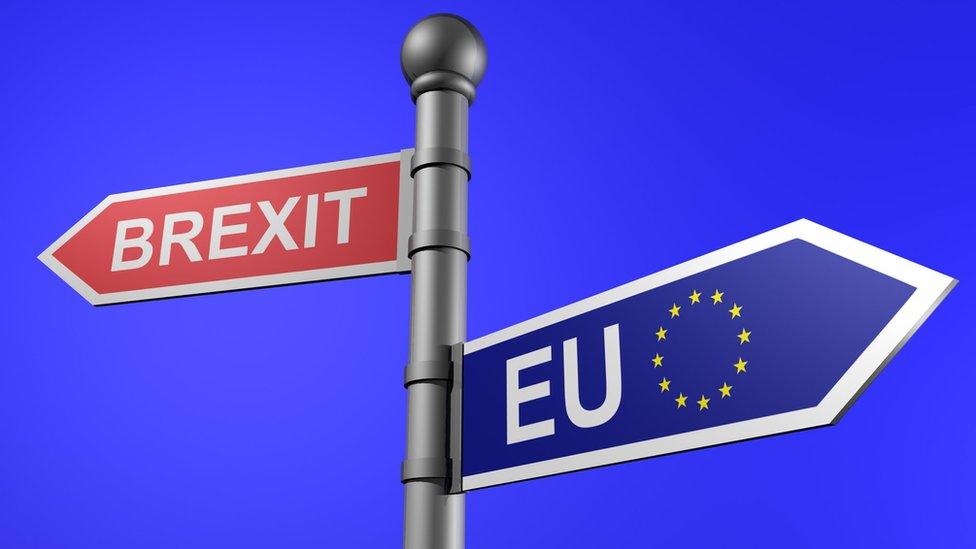Brexit won't be completed in two years, says Simon Fraser
- Published
"We won't have resolved everything... before the expiry of the Article 50 process" - Sir Simon Fraser
The future relationship between the UK and the EU will not be negotiated within two years, says the former head of the Foreign Office.
Separation talks could be completed within the two year deadline set out in Article 50, but a future relationship would take longer to negotiate, Sir Simon Fraser told BBC Newsnight.
Sir Simon said "transitional arrangements" would be necessary.
Prime Minister Theresa May will invoke Article 50 on Wednesday.
"It's certain that we won't have resolved everything in the period before the expiry of the Article 50 process," Sir Simon Fraser told BBC Newsnight.
"The EU side want to start with negotiating the terms of the separation... And the British side, on top of that, wants to move rapidly to discuss the future relationship - both political and economic - between Britain and the EU. And that is a very complex second set of negotiations."
Because of the difficulty of defining the future relationship, Sir Simon, who held senior posts in Brussels and Whitehall before becoming the head of the diplomatic service, believes talks will soon shift to the nature of 'transitional arrangements'. This means vital questions about how the UK does business with the EU could be left unresolved far beyond 2019.
Many Brexit supporters had hoped informal negotiations with the EU could start before the Article 50 clock begins ticking this week. Negotiations are limited to two years.
But Sir Simon said the European Commission has thwarted such plans: "There has been a very disciplined position across the EU, and I don't think that there has been a lot of informal behind the scenes discussion of the agenda or of the key issues yet."
Sir Simon is also sceptical that the UK will be able to play off different countries among the EU's 27 countries.
"The UK has got to negotiate with the EU as a whole through the EU's appointed negotiator, which will be essentially led by the Commission."
He added: "I think it would be a mistake to try divide and rule because I don't think that that will work."
While Article 50 allows up to two years to reach an agreement, the EU's chief negotiator, Michel Barnier, has said he wants the outline of a deal to be ready by autumn 2018, in the hope that it can then go before the European Parliament for ratification and member states for agreement well before the deadline is up.
But many diplomats, Sir Simon Fraser among them, believe that there will be no serious political discussions before this autumn, following the German elections.
'Ill will and turbulence'
While Brexit dominates national debate in the UK, it is a secondary issue for many European governments.
This could lead to delays in negotiations with many governments not taking positions until they have to. Combined with the complexity of the Brexit discussions, many diplomats believe that the UK could find itself close to a "cliff edge" without final agreement.
Sir Simon said while it was in the interest of both sides to avoid such a scenario, there was a "risk of political ill will and turbulence - both political and economic" if a deal is not reached within the Article 50 timeframe.
It is for this reason that Mr Barnier may want to make transitional arrangements dependent on a resolution of one of the first items on the EU's divorce agenda: getting the UK to agree to paying a bill of tens of billions into the Commission's coffers.
Mark Urban, external is diplomatic and defence editor for BBC Newsnight
- Published14 October 2017
